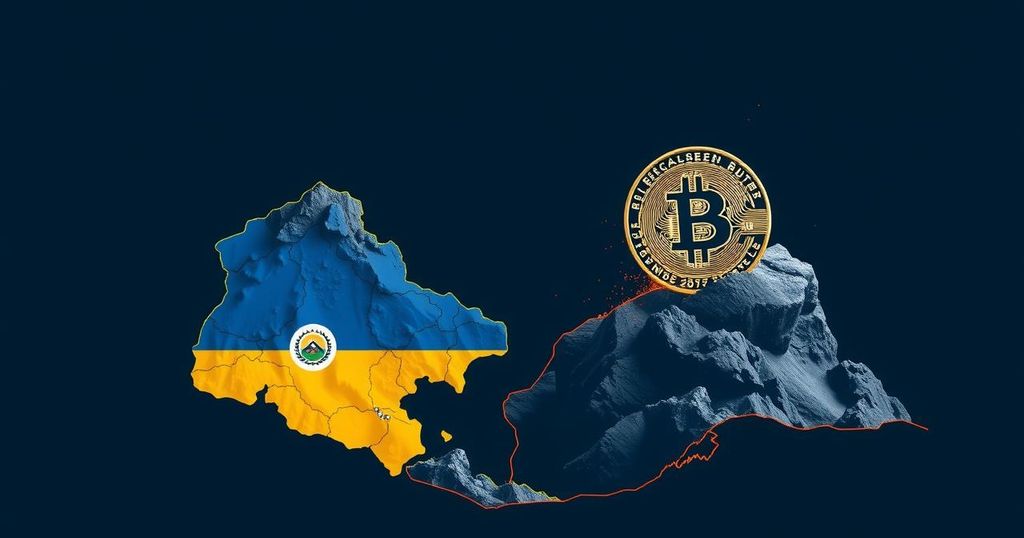El Salvador and Bhutan are leading in national Bitcoin adoption, with El Salvador acquiring nearly 6,000 BTC and Bhutan boasting over 12,000 BTC from mining. Their leaders’ firm conviction in Bitcoin’s potential showcases an emerging trend where smaller nations utilize cryptocurrency to reshape their economic futures. As El Salvador approaches a potential IMF agreement thanks to growing BTC values, both nations exemplify how strategic Bitcoin initiatives can ignite economic progress.
El Salvador and Bhutan have emerged as pioneering nations in the world of Bitcoin adoption, thereby reshaping their financial narratives on the global stage. El Salvador, under the leadership of President Nayib Bukele, has been actively accumulating Bitcoin since late 2022 and now holds nearly 6,000 BTC, a strategy launched despite widespread skepticism about the viability of cryptocurrency. Conversely, Bhutan has engaged in mining operations and other activities to amass over 12,000 BTC, leveraging national resources to create wealth. Both nations exemplify strong leadership’s pivotal role in embracing Bitcoin amid a rapidly evolving financial landscape.
The journey of Bitcoin adoption in El Salvador began controversially when Bukele declared BTC legal tender in 2021. Critics predicted dire outcomes; however, the country’s continued purchases have placed it in a favorable position as Bitcoin’s value surged over time. Reports indicate that El Salvador may finalize a significant agreement with the International Monetary Fund (IMF) due to improved perceptions regarding its Bitcoin strategy. The recent leap in BTC prices has possibly influenced the IMF’s willingness to assist El Salvador in securing loans.
Bhutan’s approach has been distinct, focusing primarily on the strategic utilization of its abundant hydropower resources for Bitcoin mining. This effort has resulted in a substantial BTC treasury valued at approximately $1.1 billion. The Bhutanese government’s strategy highlights the efficient allocation of national resources, showcasing a model that other nations could emulate. The Kingdom’s method stands out as it aims for revenue generation through existing capabilities without excessive investments.
As both nations navigate their respective Bitcoin paths, the leadership styles of Bukele and the Bhutanese authorities stand out. Agne Linge, an expert from WeFi, emphasizes that the commitment of these leaders is critical to their countries’ successes. Their endeavors challenge larger economies to reconsider Bitcoin adoption to keep pace with the digital evolution. Additionally, there is optimism that more nations will follow suit, particularly if larger economies begin to acknowledge the advantages of Bitcoin within their financial frameworks.
The potential benefits of Bitcoin strategies seem significant for developing countries with limited foreign exports, especially those endowed with affordable energy resources. As nations harness Bitcoin’s advantages, larger economies such as the United States are contemplating incorporating BTC into their reserve strategies.
In conclusion, the experiences of El Salvador and Bhutan demonstrate the transformative potential of Bitcoin as a financial asset. Their unique approaches underscore the varying methods that countries can adopt to leverage this cryptocurrency’s capabilities. With the digital financial landscape rapidly evolving, the call for broader adoption is more pressing than ever, setting the stage for other nations to consider such innovative strategies.
The rise of Bitcoin has invoked considerable global interest, particularly from nations seeking to redefine their economic standing. El Salvador and Bhutan, despite their smaller size and economic limitations, have stepped forward as leaders in Bitcoin adoption. El Salvador’s controversial move to accept Bitcoin as legal tender was initially met with skepticism yet has since garnered attention as its treasury grows. Bhutan, on the other hand, has focused on Bitcoin mining, maximizing its natural resources to build a substantial cryptocurrency reserve. These strategies are not only elevating their national profiles but also unlocking new paths for economic growth in a rapidly digitalizing economy.
El Salvador and Bhutan’s proactive strategies in adopting Bitcoin highlight the potential of cryptocurrencies to influence national economies positively. The compelling leadership behind these initiatives, coupled with strategic resource management, has allowed these small nations to make significant strides in the financial arena. As the world observes their successes, the potential for broader Bitcoin adoption grows, signaling a possible shift in how smaller economies can leverage digital assets to foster economic growth and stability.
Original Source: www.ibtimes.com






